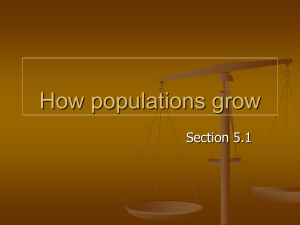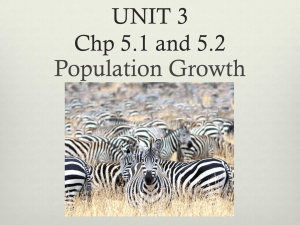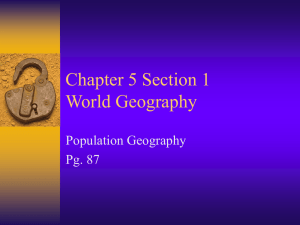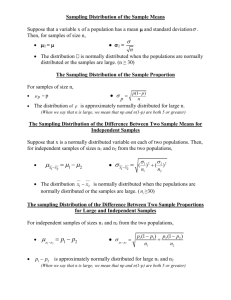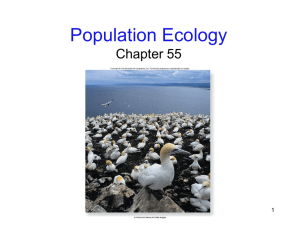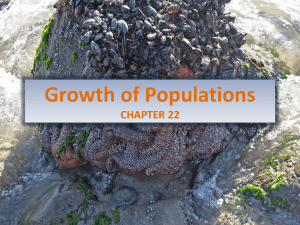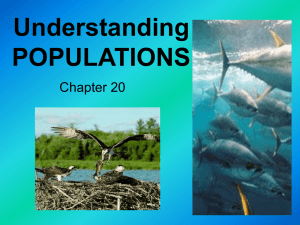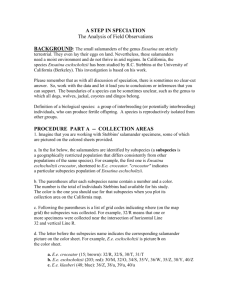Appendices I & II - English (Revised version)
advertisement
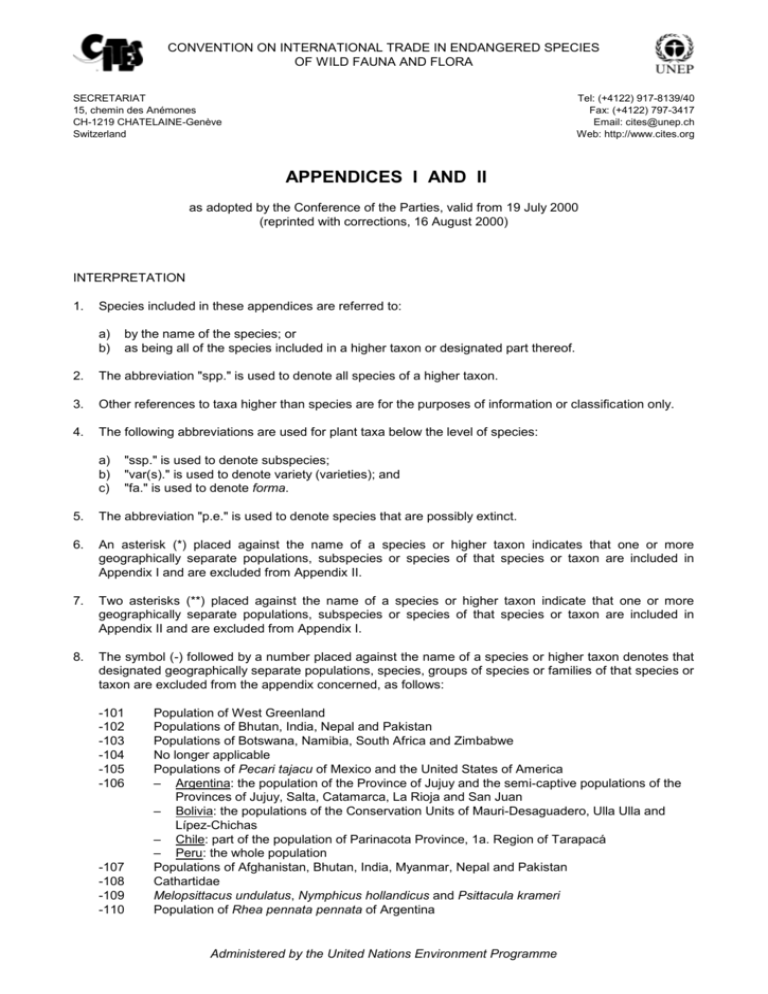
CONVENTION ON INTERNATIONAL TRADE IN ENDANGERED SPECIES OF WILD FAUNA AND FLORA SECRETARIAT 15, chemin des Anémones CH-1219 CHATELAINE-Genève Switzerland Tel: (+4122) 917-8139/40 Fax: (+4122) 797-3417 Email: cites@unep.ch Web: http://www.cites.org APPENDICES I AND II as adopted by the Conference of the Parties, valid from 19 July 2000 (reprinted with corrections, 16 August 2000) INTERPRETATION 1. Species included in these appendices are referred to: a) b) by the name of the species; or as being all of the species included in a higher taxon or designated part thereof. 2. The abbreviation "spp." is used to denote all species of a higher taxon. 3. Other references to taxa higher than species are for the purposes of information or classification only. 4. The following abbreviations are used for plant taxa below the level of species: a) b) c) "ssp." is used to denote subspecies; "var(s)." is used to denote variety (varieties); and "fa." is used to denote forma. 5. The abbreviation "p.e." is used to denote species that are possibly extinct. 6. An asterisk (*) placed against the name of a species or higher taxon indicates that one or more geographically separate populations, subspecies or species of that species or taxon are included in Appendix I and are excluded from Appendix II. 7. Two asterisks (**) placed against the name of a species or higher taxon indicate that one or more geographically separate populations, subspecies or species of that species or taxon are included in Appendix II and are excluded from Appendix I. 8. The symbol (-) followed by a number placed against the name of a species or higher taxon denotes that designated geographically separate populations, species, groups of species or families of that species or taxon are excluded from the appendix concerned, as follows: -101 -102 -103 -104 -105 -106 -107 -108 -109 -110 Population of West Greenland Populations of Bhutan, India, Nepal and Pakistan Populations of Botswana, Namibia, South Africa and Zimbabwe No longer applicable Populations of Pecari tajacu of Mexico and the United States of America – Argentina: the population of the Province of Jujuy and the semi-captive populations of the Provinces of Jujuy, Salta, Catamarca, La Rioja and San Juan – Bolivia: the populations of the Conservation Units of Mauri-Desaguadero, Ulla Ulla and Lípez-Chichas – Chile: part of the population of Parinacota Province, 1a. Region of Tarapacá – Peru: the whole population Populations of Afghanistan, Bhutan, India, Myanmar, Nepal and Pakistan Cathartidae Melopsittacus undulatus, Nymphicus hollandicus and Psittacula krameri Population of Rhea pennata pennata of Argentina Administered by the United Nations Environment Programme -111 -112 -113 -114 -115 -116 9. Population of Ecuador, subject to a zero annual export quota until an annual export quota has been approved by the CITES Secretariat and the IUCN/SSC Crocodile Specialist Group Populations of Botswana, Ethiopia, Kenya, Madagascar, Malawi, Mozambique, South Africa, Uganda, the United Republic of Tanzania (subject to an annual export quota of no more than 1600 wild specimens including hunting trophies, in addition to ranched specimens), Zambia and Zimbabwe Populations of Australia, Indonesia and Papua New Guinea Populations of Argentina and Chile All species that are not succulent Aloe vera; also referenced as Aloe barbadensis. The symbol (+) followed by a number placed against the name of a species, subspecies or higher taxon denotes that only designated geographically separate populations of that species, subspecies or taxon are included in the appendix concerned, as follows: +201 +202 +203 +204 +205 +206 +207 +208 +209 +210 +211 +212 +213 +214 +215 +216 +217 +218 +219 Populations of Bhutan, India, Nepal and Pakistan Populations of Bhutan, China, Mexico and Mongolia Populations of Cameroon and Nigeria Population of Asia Populations of Central and North America Populations of Bangladesh, India and Thailand Population of India Populations of Botswana, Namibia, South Africa and Zimbabwe Population of Argentina Population of South Africa – Argentina: the population of the Province of Jujuy and the semi-captive populations of the Provinces of Jujuy, Salta, Catamarca, La Rioja and San Juan – Bolivia: the populations of the Conservation Units of Mauri-Desaguadero, Ulla Ulla and Lípez-Chichas – Chile: part of the population of Parinacota Province, 1a. Region of Tarapacá – Peru: the whole population Populations of Afghanistan, Bhutan, India, Myanmar, Nepal and Pakistan Population of Mexico Populations of Algeria, Burkina Faso, Cameroon, the Central African Republic, Chad, Mali, Mauritania, Morocco, the Niger, Nigeria, Senegal and the Sudan Population of Seychelles Population of Europe, except the area which formerly constituted the Union of Soviet Socialist Republics Population of the Russian Federation Populations of the Americas Populations of Argentina and Chile. 10. The symbol (=) followed by a number placed against the name of a species, subspecies or higher taxon denotes that the name of that species, subspecies or taxon shall be interpreted as follows: =301 =302 =303 =304 =305 =306 =307 =308 =309 =310 =311 =312 =313 =314 Also referenced as Phalanger maculatus Includes family Tupaiidae Formerly included in family Lemuridae Formerly included as subspecies of Callithrix jacchus Includes generic synonym Leontideus Formerly included in species Saguinus oedipus Formerly included in Alouatta palliata Formerly included as Alouatta palliata (villosa) Includes synonym Cercopithecus roloway Formerly included in genus Papio Includes generic synonym Simias Includes synonym Colobus badius kirkii Includes synonym Colobus badius rufomitratus Includes generic synonym Rhinopithecus Appendices / Apéndices / Annexes I & II (19/07/2000) – p. 2
